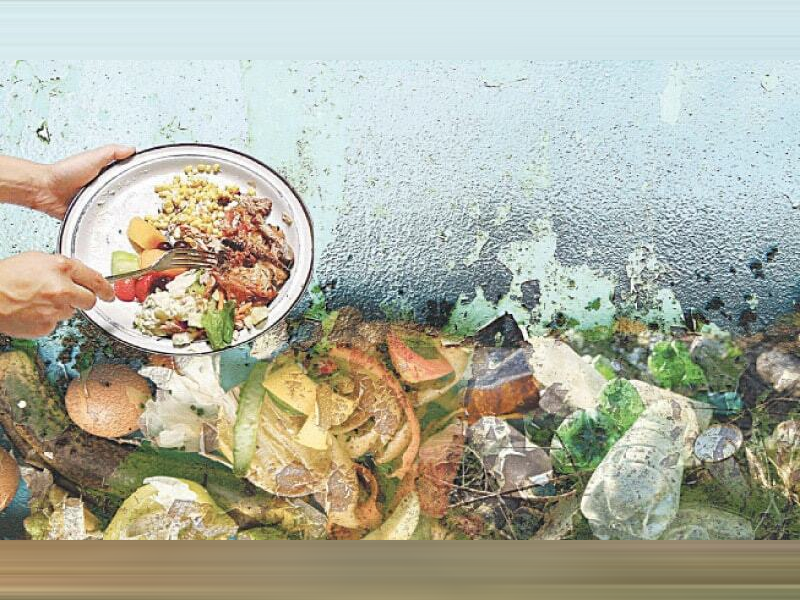Tackling food waste, a grassroots effort in Sindh
(Researcher, Environmentalist and Food Waste Awareness Activist)

- 318
- 0
"Before this awareness workshop, I never thought about food waste as a serious problem in our country," remarked a college student in Khairpur, Sindh.
This sentiment underscores a significant challenge in Pakistan: the pervasive lack of awareness among consumers about food waste. In 2022, I initiated my first food waste awareness workshop in a small village in Sindh. I posed a simple question to a class of thirty-five primary students: "Do you waste food?" Only six admitted, "Yes, we waste food." This pattern is repeated in workshops at colleges and universities across Sindh.
When I reframed the question to, "Who is wasting 36 million tonnes of food every year in Pakistan, according to research?" the typical response was, "Others waste it, not me." This highlights a critical issue: a widespread unawareness of personal responsibility for food waste, hindering effective solutions. Food waste in Pakistan is a severe issue, impacting social, economic, and environmental dimensions. The last three years have seen floods devastate agricultural produce, driving up food prices. Additionally, El Niño has significantly reduced crop yields, with cotton and rice production dropping by 40% and 15%, respectively, exacerbating food insecurity. In 2023, Pakistan ranked 102 out of 125 countries on the Global Hunger Index, with 40% of children under five suffering from stunting, threatening the nation's future. Despite being an agricultural country, Pakistan struggles to secure food for its population. Since 2018, reports have indicated that Pakistan wastes about 40% of its annual food production.
This figure has remained unchanged in research and media reports, but the pandemic and severe climate events, such as the 2022 floods and the impacts of El Niño, suggest that current statistics may be outdated. This underscores the urgent need for updated research on food waste in Pakistan. Meanwhile, the lack of awareness among Pakistani youth, a significant demographic group, is concerning. "I often see students leaving food on their plates in the cafeteria, which ends up being thrown away. I never realized the seriousness of this issue," shared a university student from Karachi. According to research, people are aware of environmental issues but unconscious of food waste as a critical concern. This gap in awareness necessitates targeted educational campaigns and initiatives to engage the younger generation. Combating food waste in Pakistan requires policy interventions, strategic government planning, and grassroots awareness campaigns.
Recognizing the potential of Pakistan's youth, who make up a large part of the population, I have voluntarily launched nationwide awareness campaigns in educational institutions. These initiatives focus on teaching students sustainable practices and the negative impacts of food loss. I have conducted eight awareness sessions in Sindh, engaging over 400 students and 11 teachers. Collecting data on students' perceptions of food waste helps tailor educational programs and design specific interventions to change attitudes and behaviours regarding food consumption and waste. At a wedding, guests serve themselves eagerly, but half the food goes to waste" (A picture taken by a student) The majority of wastage happens in university cafeterias and restaurants in top-tier cities of Pakistan. Wedding halls and religious ceremonies are also significant contributors to plate waste in the country.
Addressing this issue requires mass awareness and collective action to adopt sustainable practices in daily life. Educating young people about the broader implications of food systems can enhance rural economies, social welfare, and service provision. By integrating education, community initiatives, and policy changes, Pakistan can reverse the trend of food waste, ensuring a more sustainable and food-secure future. These awareness workshops also aim to create an environment that encourages young people to explore and pursue opportunities within food systems. Enhancing agricultural productivity and fostering innovations such as mechanization, agricultural advisories, and improved irrigation systems can make farming more profitable and less physically demanding, attracting more youth to the sector. To develop sustainable food systems and maintain youth involvement, leaders must ensure that policies extend beyond the 2030 Sustainable Development Goals, aiming for longterm objectives through 2050 and beyond. This is crucial to reducing food waste and improving food security in the future, fostering lasting change in Pakistan.

















































